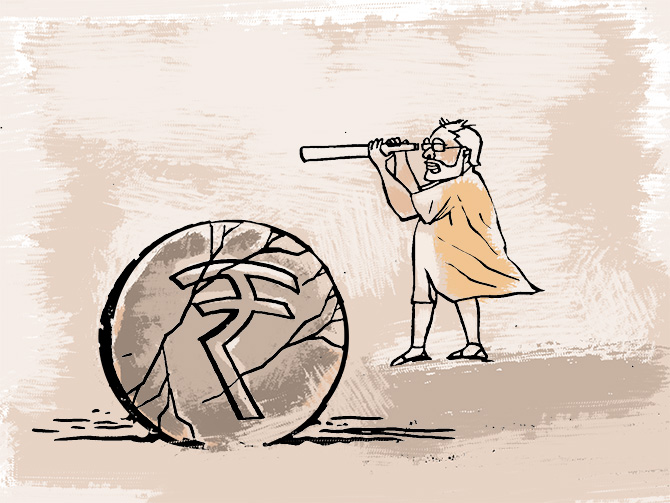 | « Back to article | Print this article |
S&P Global Ratings has forecast India's economy to shrink by 5 per cent in the current fiscal. It, however, has projected GDP growth to be 8.5 per cent in 2021-22 and 6.5 per cent in 2022-23.

Global rating agency S&P on Wednesday retained India's sovereign rating at the lowest investment grade of 'BBB-' for the 13th year in a row, even as it said the economy and fiscal position will stabilise and begin to recover from 2021 onwards.
Affirming the outlook "stable", it said though risks to long-term growth are rising, India's ratings reflect the country's above-average real GDP growth, sound external profile and evolving monetary settings.
S&P Global Ratings has forecast India's economy to shrink by 5 per cent in the current fiscal. It, however, has projected GDP growth to be 8.5 per cent in 2021-22 and 6.5 per cent in 2022-23.
The Indian economy grew at the slowest pace in 11 years at 4.2 per cent in 2019-20.
"While risks to India's long-term growth rate are rising, ongoing economic reforms, if executed well, should keep the country's growth rate ahead of peers," S&P said in a statement.
Affirming 'BBB-' long-term and 'A-3' short-term foreign and local currency sovereign credit ratings on India, S&P said it "reflects the country's above-average real GDP growth, sound external profile, and evolving monetary settings".
"India's strong democratic institutions promote policy stability and compromise and also underpin the ratings.
“These strengths are balanced against vulnerabilities stemming from the country's low per capita income and consistently elevated fiscal deficits that contribute to high general government debt, net of liquid assets," S&P said.
The rating affirmation comes within days of Moody's Investors Service downgrading by a notch India's sovereign rating to the lowest investment grade with negative, citing growing risks that Asia's third-largest economy will face a prolonged period of slower growth amid rising debt and persistent stress in parts of the financial system.
Fitch Ratings too has a 'BBB-' rating on India, with a stable outlook.
Fitch Ratings also forecast a 5 per cent contraction in India's GDP in 2020-21 fiscal and a rebound in the next to 9.5 per cent growth.
S&P said the economic hit from COVID-19 will exacerbate India's weak fiscal settings, but the country will get into the path of fiscal consolidation over the next three years.
"The stable outlook reflects our expectation that India's economy will recover following the containment of COVID-19 pandemic and the country will maintain its sound net external position.
“The stable outlook also assumes that the government's fiscal deficit will recede markedly following a multi-year high in the fiscal year 2021," S&P said.
S&P said the global economic downturn resulting from the pandemic, along with strict domestic measures aimed at containing the spread of the local epidemic, are hitting the economy hard, and will likely result in a significant fall in activity in the first quarter of this fiscal year (i.e. three months from April 1, 2020).
"Productive capacity has been severely disrupted during this period, and millions of workers have left their jobs to return home, sometimes crossing the country to do so.
“India's labour markets have therefore weakened dramatically, and may take some time to heal," S&P said.
The rating agency had in 2007 assigned a 'BBB-' rating to India. It has been maintaining a stable outlook on India since September 2014.
Stating that India's low per capita income weighs on its strong economic growth outlook, S&P said India's low per capita income weighs on its strong economic growth outlook.
The strong mandate for the Bharatiya Janata Party-led coalition government in the 2019 parliamentary elections should provide sufficient political capital to push further reforms, but execution remains key, it noted.
Even after incorporating a deep contraction this fiscal year, it said India's economy continues to outperform peers at a similar level of income on a 10-year, weighted average, real GDP per capita basis.
"However, new risks are emerging that could undermine the economy's recovery, even beyond the containment of COVID-19," S&P said.
The economy's long-term outperformance highlights its resilience, the agency added.
India's wide range of structural trends, including healthy demographics and competitive unit labour costs, work in its favour, it said.
"A more favourable corporate tax regime, which is particularly supportive of manufacturing firms, should reinforce growth, alongside additional fiscal and monetary easing," it said.
S&P said that the results of the general elections in 2019 suggest that major policy undertakings by the Modi government in its first term, including GST and demonetisation, have not materially undermined support for the BJP-led coalition.
India's fiscal deficit will be significantly higher this year due to the government's response to the COVID-19 pandemic, as well as weaker revenue generation, the rating agency said.
The Indian government, the agency said, has introduced additional expenditure measures to mitigate the impact of the COVID-19 crisis, and associated virus containment measures, on the economy.
"Alongside a much weaker revenue outlook, we forecast that this will translate to a spike in the general government's fiscal deficit to 11 per cent of GDP," it said.